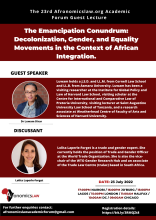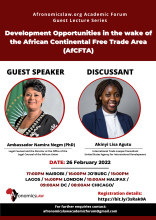Book Review Symposium V: The African Continental Free Trade Area Agreement: Legal and Policy Frameworks (Routledge, 2024)
The African Continental Free Trade Area (AfCFTA) agreement signifies a transformative milestone in Africa’s quest for regional economic integration. In The African Continental Free Trade Area Agreement: Legal and Policy Frameworks, Collins C. Ajibo delivers a rigorous and interdisciplinary analysis of the AfCFTA, deftly integrating legal, economic, and institutional perspectives. The book illuminates the complexities of this ambitious initiative, balancing an exploration of its challenges with an articulation of its immense potential. Ajibo systematically unpacks the theoretical foundations, operational challenges, and transformative possibilities inherent in the AfCFTA, positioning it as a vital mechanism for sustainable development in Africa.

